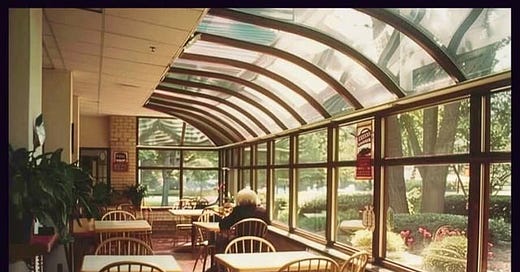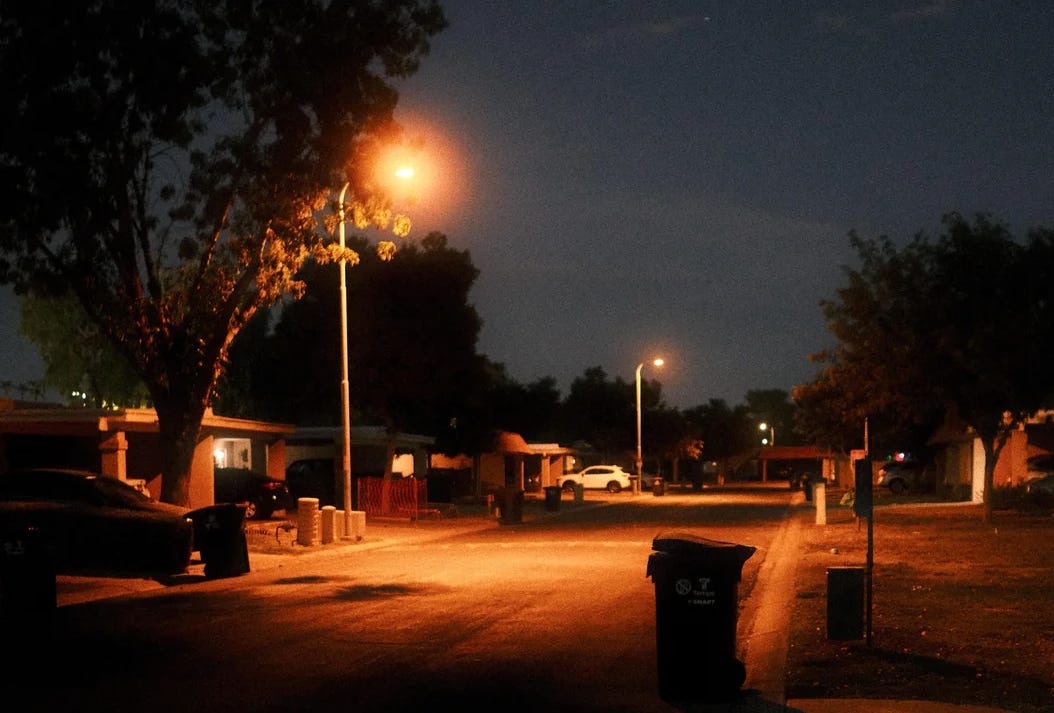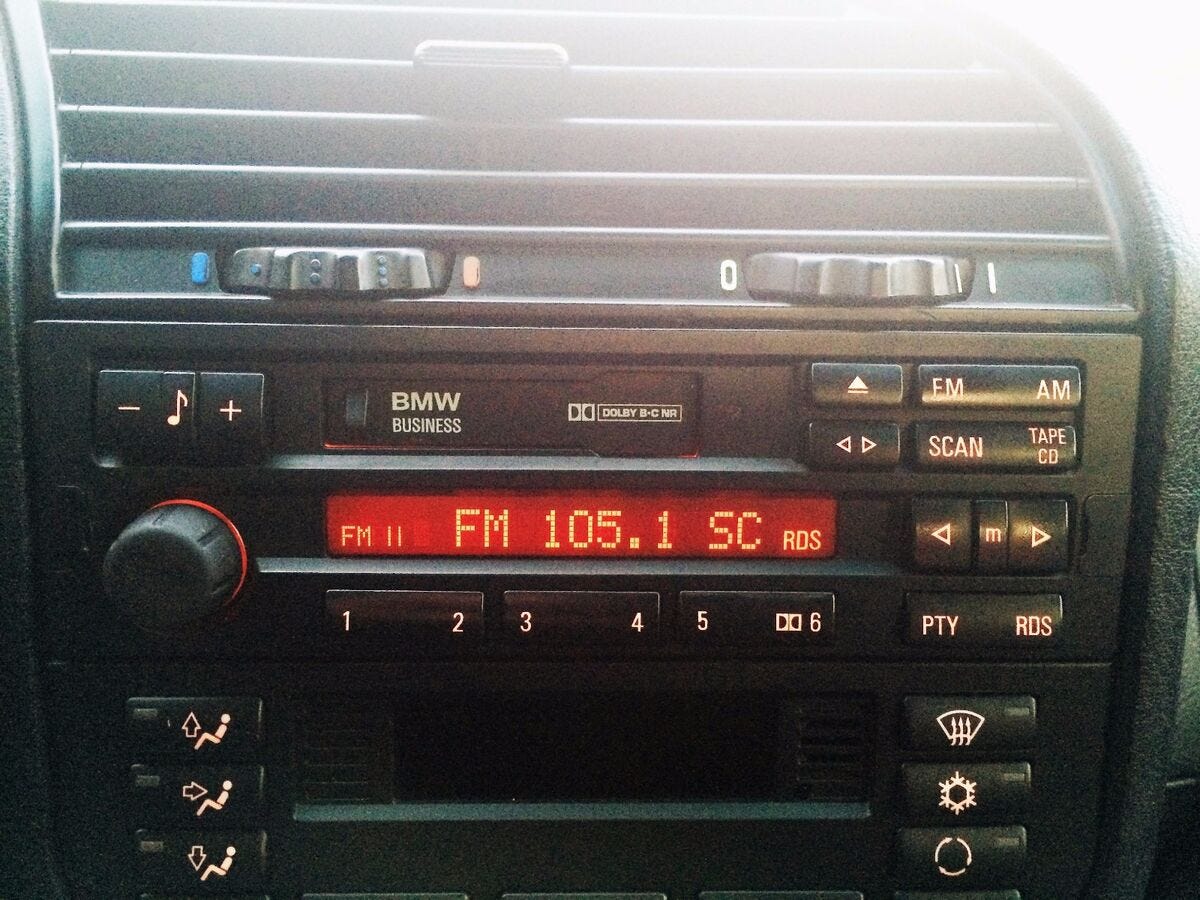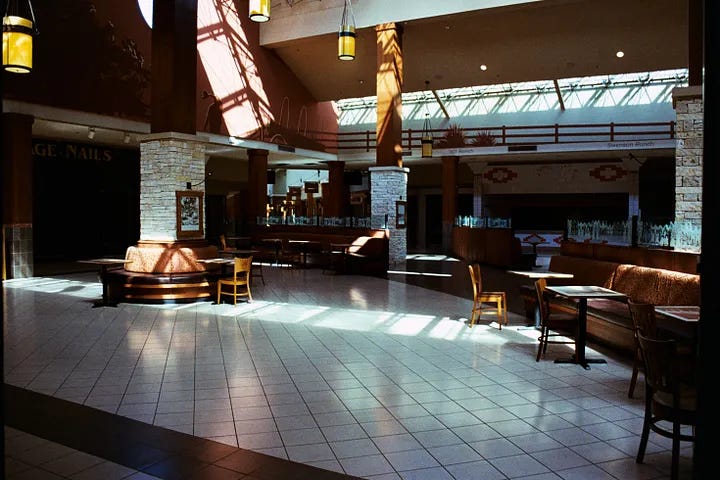Nostalgia: Curse or Boon?
Was It Better Way Back When ? Culture, Identity, and Rose-Coloured Glasses
Every generation thinks it was the last good one.
Me ?
I'm wondering if the 90s were better — or if they just hurt less.
A Parable
A man found a jacket folded up in the back of his closet.
He hadn’t worn it since he was young — and it fit tight now, especially around the shoulders and stomach.
The elbows were worn thin, the collar was fraying, and there was a milkshake stain on the left arm.
From that one time, he thought. With Carolyn.
As he zipped it up, he swore he could hear the music from his old car — the one he sold over twenty years ago.
When he closed his eyes, he could see it all again, smell it, too.
Walking to Blockbuster with his mom and dad, when they were still in love.
Kellogg’s cereal bowls on the counter.
His old bike with the training wheels on the front stoop.
Morning doves.
Friends playing street hockey under the a clear blue summer sky.
Running home when the street lights came on.
The Sears Christmas catalogue, thick and wonderful in his hands.
He saw it all.
He felt the beautiful sadness.
The jacket didn’t fit anymore.
But he could remember.
And maybe that was enough.
Lately I’ve been trying to figure it out — why everything seemed to make sense back then — why it seemed easier to be a person, easier to belong, easier to believe in magic.
Maybe it’s because I was a kid, or maybe it was something else.
It wasn’t perfect, I know.
But something held us; and I know that, too.
Maybe it was the limits, maybe it was because we couldn’t do it all.
Maybe it was the way we bumped into each other more — at grocery stores and cafes and on back porches.
Maybe it happened because we couldn’t disappear into a thousands screens,
Maybe.
This isn’t about going back, at least, I don’t think it is.
I don’t even know if I would, if I could.
This is about trying to name what I lost, figure out what’s me and what’s not me, and then try to sort out what it means to live.
I don’t have the answers. These are just stones I’m turning over on the path, scribbles in my journal, 90s nostalgia doom-scrolls when the kids go to sleep.
So, here’s what I’ve been thinking.
1. The Cultural Hooks that Connected Us
I remember TGIF on Friday nights:
Boy Meets World.
Family Matters.
Carl Winslow and Steve Urkel.
I remember Goosebumps on TV, Darkwing Duck, Batman: The Animated Series.
Later, Fear Factor on Mondays. Fresh Prince. Seinfeld. King of Queens.
And I remember, all along the way, talking about those shows the next day at school —
because we all watched the same things, at the same time.
Separate homes.
Same stories.
I still remember the tears when Will Smith asked, “How come he don’t want me, man?”
And it felt like the world wept together.
Movies were slow too.
A trip to Blockbuster once a week, maybe a special TV airing. Nothing like the Bottomless Pit Netflix offers now, drowning us in infinite options.
Even the news was slower. Morning papers. Evening broadcasts. Magazines. Definitely not the infinite feed streamed into our brains 24/7, tailored to all our biases.
And I don't know about you — but something about that makes sense to me.
Something about that rhythm feels more human.
We lived, somehow, in a kind of unison. When the seasons changed, we all decorated at once. We heard the same songs on the radio. We told the same jokes from sitcoms. We lined up to see the same movies.
We were, in some strange way, more one.
It's hard to imagine any modern equivalent — any cultural moment that knits us together the way those rhythms did.
Now ?
It’s eight billion drums banging out eight billion different rhythms — songs and stories and images stacked on top of each other, faster than anyone can feel them.
Barely processing any of it.
But I mean something bigger than just media — so stay with me.
The magic of that time wasn’t the content — it was the connection. The way those songs and stories became the gathering fires we circled around.
Nights together in living rooms watching X-Files, 7th Heaven, Walker Texas Ranger.
You watched a story with your family and then you carried it to your friends the next morning. And somehow it knit us all a little closer together.
I remember playing Manhunt in my neighbourhood — , ringing doorbells, calling on my friends and then running barefoot through backyards.
I remember the parents sitting in lawn chairs on the driveway — or on their back porches — beers in hand, catching up, keeping an eye on us under the humming summer dusk.
We had these hooks — moments of embodiment, of laughter, of shared breath.
Even alone, there was common ground — Harry Potter books dog-eared and passed around. Whispered about in between classes. Pokemon Red, Blue, Gold and the battles we'd tell each other about at school.
There were concentric circles that tied us together — self, family, friends, street, city, nation.
And then — the internet, the computer. The family computer sat in the living room, clacking and slow. It had that dial-up buzz ring when you connected.
You couldn’t live online.
You could only visit.
Websites weren't psychological weapons crafted to hijack our minds to profiteer on. They were — for a little while — virtual third spaces: gathering places, slow and simple extensions of real life.
The life on the screen bent itself around the life in the house.
Now?
The screen bends the house.
The gate to the digital world used to be narrow.
Few entered.
And even fewer stayed too long.
We didn’t know what we had, I guess.
We didn’t know that all these things knit us together, made us cohesive — not by algorithms, or the idea of endless choice.
But by word of mouth, by hand on shoulder, by patience, and shared stories.
Now those gathering fires are embers, each of us living by the light of a screen.
2. Identity and What Makes us Human
I think, when I look back, it was these boundaries that helped make it all make sense.
We were formed by limits, not infinite choice —
I was driving with Ransom last week, to a park on the other side of town. His favourite song right now is Ring of Fire and he asks to listen to it every drive.
And we used to.
But we don’t anymore.
Because when I was young, it was magic when your favorite song came on the radio — out of nowhere, without warning, you’d hear that first riff, and your whole chest would light up.
If you were lucky, you had a tape in the deck — and you’d run to hit record.
You could catch it, you could hold it, and you could listen again.
That magic — that limitation — it formed me.
And now I think about my son.
I don’t want him to be shaped by endless choice, by stream culture, by instant gratification.
I want him to know the magic of waiting.
I want him to know what it means to long for something — and then receive it like a gift.
I want him to know the joy of surprise.
Because life happens in our bodies. Life happens in places. Life happens with faces and the burning in your chest.
We were shaped by geography : By sidewalks and kitchens and playgrounds. By the lady at the corner store, by the guy at the gas station, by the regulars at the diner down the way.
Our lives weren’t curated — we’ren’t crafted for a feed, for likes or comments or anonymous affirmation.
Living wasn’t a performance, it wasn’t brand building.
We just lived. We entered spaces and belonged.
We knew each other by presence, not performance.
And I think that’s how we were made — as humans — as Imagers.
As Icons.
As Living reflections of the Divine.
And all of that demands connection; real communion, not isolation.
We become real by being in real relationship with others, with God, and with the world. There is no disembodied becoming.
And for all its flaws — and there were many — the 90s still gave us that. Maybe by mistake, maybe by inability, maybe by chance.
And it was a gift.
We hadn’t yet opened Pandora’s Box; we still lived in a world of flesh and blood, not just pixel and screen.
And because of all those limitations, because of all that inconvenience, we became — through community,
through encounter,
through relationship,
through friction.
Today ?
It feels disembodied. Fragmented. Impossible to close the box and go back.
3. Rose-Colored Glasses: Nostalgia's Curse and Blessing
I don’t know if any of this is actually true.
Nostalgia, I’m pretty sure, is selective memory.
I remembering the things that saved me, not the things that scared me — I’m remembering the joy of waiting for the bus, of Scholastic Bookfairs, of sitting on green transformer boxes watching the sunset with my friends.
I am remembering life with the rough edges smoothed. I’m forgetting the boredom, the loneliness, and every other thing that caused me pain.
And maybe I’m not longing for those by-gone days, maybe I am longing to be the person I used to be — that great childlike capacity for wonder.
And maybe, whatever I’m longing for is bigger than me.
“Apparently, then, our lifelong nostalgia, our longing to be reunited with something in the universe from which we now feel cut off, to be on the inside of some door which we have always seen from the outside, is no mere neurotic fancy, but the truest index of our real situation. And to be at last summoned inside would be both glory and honour beyond all our merits and also the healing of that old ache.” — CS Lewis
Maybe all this hope in the past is just proof that the present is still broken.
That things feel too fast, too disparate, too polarized, too efficient, too virtual.
Maybe it’s easier for me to understand the past because those stories, these memories, have a beginning and a middle and an end — and right now, I’m just living. One sentence at a time.
Maybe in this disembodied age, nostalgia is a kind of home — a kind of belonging. A way of settling back into a space that made sense, that had roots.
But maybe it’s all avoidance, too.
I don’t know.
At its worst, nostalgia is a substitute, I think.
A substitute for hope, a stand in for courage. It’s going backwards instead of forging new paths.
But we’re fools if we don’t learn from the past, and we’re doomed, they say, if we don’t listen to history.
Maybe all these moments are altars, and maybe, the way onward is dreaming again under starlit skies.
I want to life a life that remembers and a life that honours.
I want to build altars out of every day things.
I want the structure of my life to be ordinary and alive.
I want to wait and ache and choose joy.
Maybe the world wasn’t better then, maybe it was.
Who cares ?
Maybe we are just looking for something true.
And maybe, even in 2025, we can find it.
You Are the Pan
We used to drink hot peach juice and watch Hook just about as often as my parents would let us.
Peter forgot Neverland, forgot he was ever a kid. Traded it all in. For spreadsheets and meetings and being so busy he forgot his own kids.
He lost the magic.
He forgot how to fly.
Until he was made to remember.
Until someone whispered, “You are the Pan…”
And maybe that’s all this essay has been.
Maybe it’s not a longing for the the 90s — maybe it’s a longing to remember.
To remember the way.
How to fight.
How to fly.
How to crow.
How to play.
How to ache and wait and dream again.
Maybe growing up doesn’t mean forgetting.
Maybe it means carrying wonder into the world that needs it most.
Every Day Saints is a torchlight searching for the quiet miracles, the beautifully human stories and ideas that exist all around us. And it is a place to dialogue, not Holy Ground, but still a place of gathering.














You've beautifully captured thoughts that have been bouncing in my mind for a year now. This quote from Pascal hit me hard when I read it late 2023:
"Let any man examine his thoughts, and he will find them ever occupied with the past or the future. We scarcely think at all of the present; or if we do, it is only to borrow the light which it gives for regulating the future. The present is never our object; the past and the present we use as means; the future only is our end. Thus, we never live, we only hope to live."
This was just insanely beautiful and well done. As a father of three, I consistently struggle with this idea of creating family culture. That culture needs to be defined by these waiting, delayed gratifications, connections and such. It's so hard. The culture is not changing around us, but perhaps there will be more gathered around us of like mind.